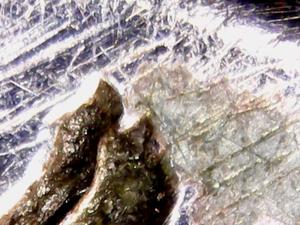Page 2 of 3
Re: 12 American Colonial Silver Buttons
Posted: Sun Mar 29, 2015 7:24 am
by steve7408
Thought I would show you the pictures where the engraver had lifted off the flakes of the surface, it reveals the cracks underneath which you can follow across the button.

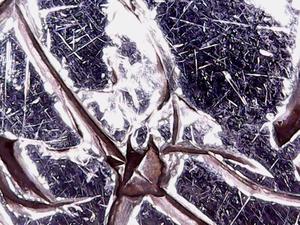
Re: 12 American Colonial Silver Buttons
Posted: Wed Apr 08, 2015 8:00 pm
by steve7408
As I mentioned in my previous post, some flakes of silver had come off due to the engraver I thought, well it seems the silversmith has done something weird.
There is this one button I have been focused on because of the silver breaking off, this reveals silver below which is tarnished through age and has been inaccessible to clean naturally, the silver upon silver is showing signs of something which has detail, I have found through high magnification elongated humps for a better word, there are three I have detected so far, these are 5mm from the edge of the 26.5mm button.
If you can imagine a clock face then, I have found the humps at 1 o'clock, 5 o'clock and 7 o'clock where the engraver has gone through the silver.
It looks like to me that the silversmith has tried to melt say a coin and added more silver to it? It also looks to me that the surface was grooved for the extra silver to adhere to? There are grooves running below the silver which has been melted and poured on top?
Before anyone mentions it, the button is most definitely not silver plated!
So my dilemma is now I need some sort of X-Ray or topography test to see what lies below, I have a clue what it may be, but I am not going to say for the moment except I do believe it is a silver coin.
See what you think on the pictures, anyone got a good idea about this button?????


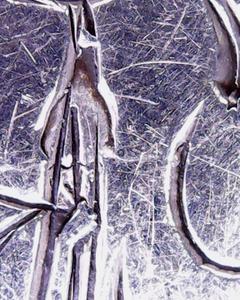
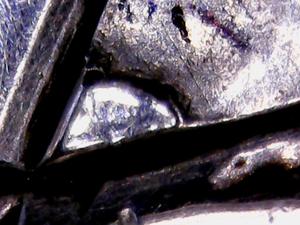
Re: 12 American Colonial Silver Buttons
Posted: Thu Apr 09, 2015 6:52 pm
by Jag
Thank you for all the references. Very interesting to see the technical side of analyzing antique silver. Its too bad the assay you had done didn't include the Iridium content, since that would nail your conclusion.
As to the cracks, its hard for me to believe that someone would try to coat a coin with silver, though I have absolutely no experience working with silver. The buttons look pretty thin - if a silversmith was starting with a coin rather than a sheet of silver, wouldn't he be able to just file down to a flat surface? Your initial thought that it was due to faulty annealing seemed more likely?
Re: 12 American Colonial Silver Buttons
Posted: Thu Apr 09, 2015 8:52 pm
by steve7408
Jag,
Pleased you like all the references, nice to have a bit more insight about antique silver.
It's not the iridium content that would nail it as you say, it's Indium which is the signature for Potosi silver, not prepared to have such a big sample taken off the button for a ICP-EOS test which I looked into, looking for better answer to the problem.
Regarding the silver on top of silver as I mentioned, I shall be posting a few more pictures which reveal other features that are not to do with annealing, then people can make their minds ups.
We shall see, as soon as I can find a proper solution to the problem of testing, post more pictures tomorrow.
Re: 12 American Colonial Silver Buttons
Posted: Fri Apr 10, 2015 7:08 am
by steve7408
I am coming across quite a few unusual formations below the top silver, from these 3 pictures that go from one side to another of an area between engraved lines.
You will notice that the silver above is either worn away or broke away, this is revealing something below which has a shape and depth, still looking into these area's of interest.



Interesting don't you think?
Re: 12 American Colonial Silver Buttons
Posted: Fri Apr 10, 2015 2:12 pm
by steve7408
Have now found a method of testing which should answer many of the questions, it's called a SEM, scanning electron microscope.
Spoke to a professor who is trying to get one of his students to do the tests, lets hope they find it interesting enough, more money but should be well worth it.
8 years of research coming closer to a conclusion, one way or the other, so tonight I shall be having a drink or two.
Re: 12 American Colonial Silver Buttons
Posted: Sun Apr 12, 2015 2:45 pm
by steve7408
These are pictures of the back of a small button, the soldering shows an area which just would not fill I presume, there looks like pieces of Quartz in the silver and the solder.
Any wise people here like to give me their opinion? it would be appreciated if you know about metallurgy.



Re: 12 American Colonial Silver Buttons
Posted: Sun Apr 12, 2015 6:51 pm
by steve7408
Here's my last picture for tonight, I have used a light across one of the earlier photographs to highlight the gold flecks and grains. it's on the others if you copy the pictures and zoom in a little, I was so captured by the quartz that I didn't see the gold!!!!!

Re: 12 American Colonial Silver Buttons
Posted: Mon Apr 13, 2015 2:24 pm
by steve7408
Two more pictures under high magnification, I have only slightly enhanced the colours due to the microscopes light making the pictures look cold.
These pictures are of the engraved lines running through the silver surface into the silver and mineral rich deposits within the buttons, it's as if they have not been refined and smelted properly. The minerals you see have not been thrown in, they have actually been cut through by the engravers sharp tool, it just gives the impression they are loose, you can also see that the side broke away a little to reveal???? Never in my life have I seen something like this.
I think a mental breakdown seems to be on the cards soon, not sure if I need a metallurgist, mineralogist or a psychologist.

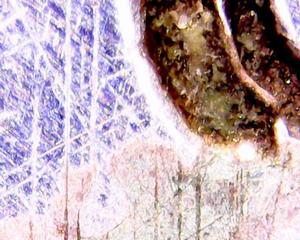
Re: 12 American Colonial Silver Buttons
Posted: Tue Apr 14, 2015 8:21 am
by steve7408
After more hours checking out the button with the cracks and flakes missing I have now come to the conclusion that: All but one of the buttons that at one time were coins have been rubbed down to remove traces of the decoration, the silversmith has then made a loop and soldered it on to turn them into buttons.
The only one that I can see different is the cracked and flaked one, the silversmith has smelted silver over the top of the coin, the difference when heating both must have been different temperatures. This is why there is missing pieces and silver that is showing runs as if poured slowly over area's, he's then rubbed it down smooth and then soldered the loop on.
The pictures to this one button show the engraver has cut through this new silver and the coin silver, this has exposed the inside of the coin which matches all the other buttons/coins. I have tried to show places that have a contrast between new and old silver, I could go on but I think I am about there now for the moment.
Hope you find the pictures interesting.



Re: 12 American Colonial Silver Buttons
Posted: Tue Apr 14, 2015 9:50 am
by Aguest
This is interesting. The mineral deposits are puzzling. I enjoy the research of this thread.
Re: 12 American Colonial Silver Buttons
Posted: Tue Apr 14, 2015 7:43 pm
by steve7408
Aguest,
Pleased you enjoy the thread, you say the mineral deposits are puzzling! You want to be at this end trying to make sense of it all, the minerals have not been refined enough as you would normally to make silver even in the 1600's? For these minerals to be fused enough to melt on the outside but only bond on the inside??? To me at present, the minerals would have had to be put in a mould, tamped down and then smelted whilst in a mould, how else could you form these buttons/coins whatever they, are as they are???? They were definitely were not smelted and poured, how could they???
Answers on a post card please
Re: 12 American Colonial Silver Buttons
Posted: Wed Apr 15, 2015 2:09 pm
by steve7408
Got a lovely picture of the quartz with a silver vein running through, you can see this has melted into a silver foil in appearance, a few of the same towards the back of the picture. If anybody who reads this thread knows someone in mineralogy, could you ask them to have a look in and give their opinion please.
Still waiting on the professor to make a date for the examination, hopefully very soon.

Re: 12 American Colonial Silver Buttons
Posted: Thu Apr 16, 2015 6:34 am
by steve7408
Re: 12 American Colonial Silver Buttons
Posted: Fri Apr 17, 2015 3:41 am
by steve7408
I have been on a mineralogy site having a discussion with some gents, this is regarding if the minerals are dust of dirt infill's.
I posted this message which should be interesting, copied and pasted from the other site:-
Gent's I am going to show you a few more pictures of a engraved line, the pictures was taken at a very slight angle, the engraved line running from the bottom left upwards and off to the left shows the angle.
The engraved line across the button shows the bottom of the trough shall we say, it clearly shows the tool scored line at the bottom, please note this is not filled with any dirt or grit, it is still clearly visible. You will also notice that the edge nearest to you of the engraved line is straight and clean cut, where as the opposite side has not been clean cut, it has actually broken away.
Remember I am at a magnification of 500x, I could not see any of this detail with a 40x eye loop, so the engraver would not have noticed any of the silver breaking away or the minerals exposed.
There's food for thought gent's !!!!

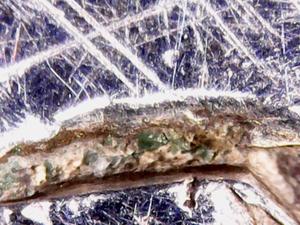
Re: 12 American Colonial Silver Buttons
Posted: Sat Apr 18, 2015 5:20 am
by steve7408
After a gentle clean with hot water and washing liquid, I had a look at this button and came across this stunning blue mineral?
Just to keep the board updated for those interested, I know it's gone a little away from the silver in a way but this is what is in the silver.
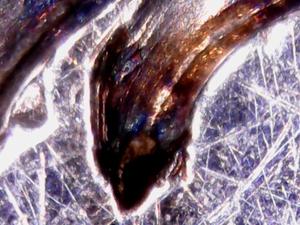


Re: 12 American Colonial Silver Buttons
Posted: Sat Apr 18, 2015 6:25 am
by dognose
Hi Steve,
Thanks for continuing to update this topic, it's very interesting.
I know little about minerals (nothing!), but the other day I read that the New York Assay Office used to sell Blue Vitriol, a by-product of refining silver, and I wondered if that is what we see here? Probably a really dumb suggestion, but perhaps worth researching.
Trev.
Re: 12 American Colonial Silver Buttons
Posted: Sat Apr 18, 2015 6:54 am
by steve7408
Trev,
Not a dumb question at all, I am like you in respect of minerals, never thought silver would take me to this subject. I find it astonishing and intriguing to say the least, as we all know silver and gold are found in mineral rocks, just don't know which ones which is a shame as I have some nice tools for breaking rocks.
I have found a mineral site forum which is very similar to this sort of set up, been asking the people on that board for their opinions, so I shall keep that one updated as well until they get sick of me, lol.
As long as people are interested in this unusual side of silver, then I shall keep posting, just let me know when you all have had enough.
Link to the mineral site if this is allowed?
http://www.mindat.org/msgboard-11.html
Cheers
Re: 12 American Colonial Silver Buttons
Posted: Sat Apr 18, 2015 6:24 pm
by steve7408
Have now got definite proof of what I have been trying to say but it has taken a while, the picture is the back edge of a small button, the edge of silver has split or worn away, this reveals a treasure trove of beautiful minerals.
Click on the image to enlarge, I'm going to chill now and have some beers, may help to straighten the eyes back into shape.
Remember this is at 500x magnification.

Re: 12 American Colonial Silver Buttons
Posted: Tue Feb 26, 2019 2:13 pm
by steve7408
Hi to all,
I haven't posted here for some time as I was unwell to say the least, all due to strong medication from my doctors which sent me off the rails so to speak. Had a mild heart attack in June 2015, meds increased again, thank God I only needed a few stents fitted, no major damage.
You will note my posts started to change around April 12th 2015, that is when med's which were changed some months prior kicked in, so please, I would advise you posts after this date ignore.
Roughly around the same time I started posting on Mindat Mineralogy forum, with exception to a very few pictures, you really need to total ignore these posts, strong microscope and strong med's very poor combination!
You will also notice that there was a long break of 6 months before I posted once more, then stopped again as my good wife noticed, I was still not right as she put it, ha ha she was right as usual.
All I can say is that I'm now back to a level head, well should I say, as good as I was before. I have since had some tests carried out on my silver buttons, it's a test where they check for impurities within the silver of each button, from these impurities they can date the manufacture of the silver.
These tests were carried out at the Assay Office, Goldsmiths' Hall, London.
The buttons/coins range from 1500 to 1600, 2 number buttons. 1600 to 1697, 7 number buttons. 1697 to 1830, 3 number buttons. the last 3 buttons have a very strong possibility of being made in 1699, a cross over of the two different date frames are nearly equal in scores.
As I have always argued, these were made from silver coins of various dates but within those time frames.
Awaiting a few answers from some people, sorry for the posts which went off the rails a bit.
All the best to everyone.






















